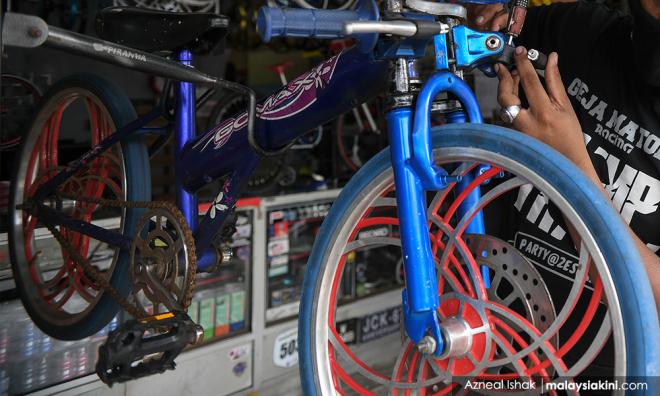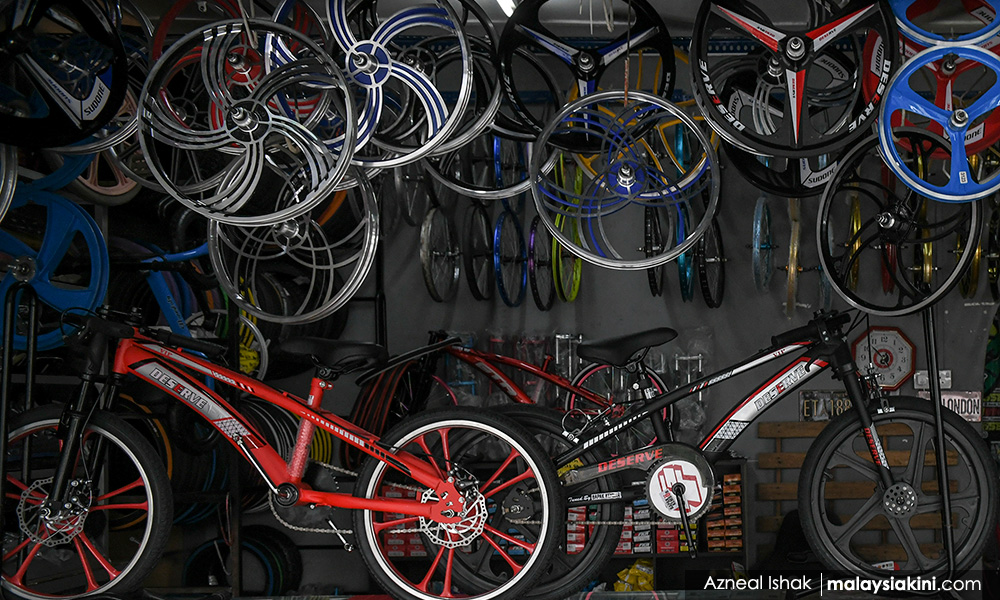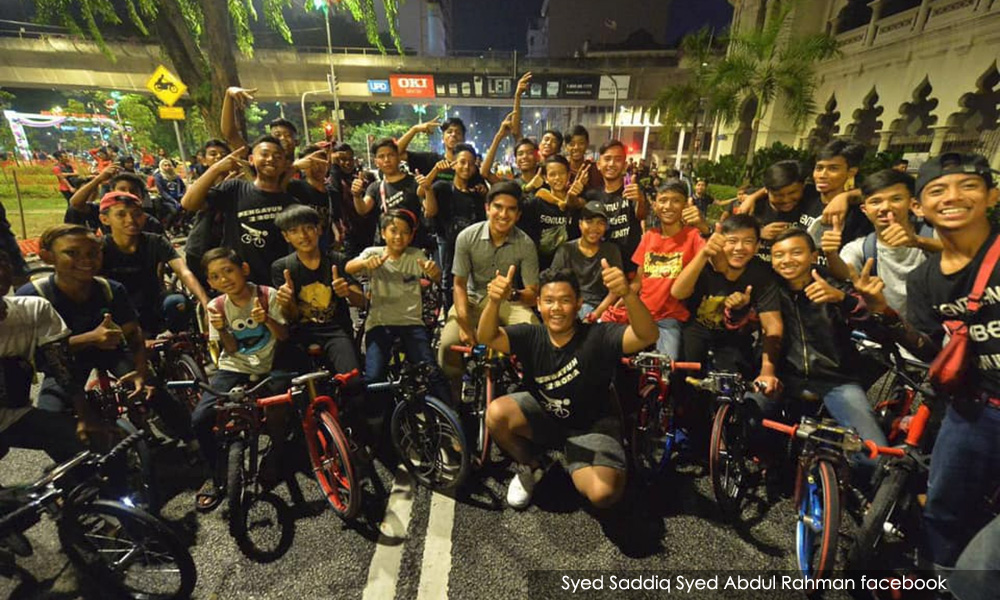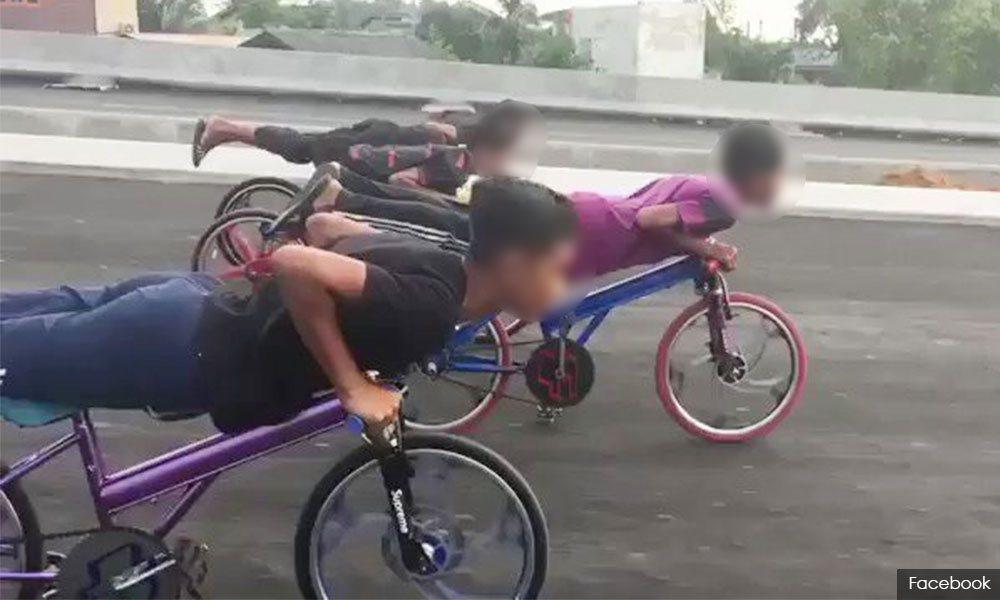
As soon as the Bapak Kembar opens for business each day at 3pm, kids in the neighbourhood flock to the small bicycle shop to check out the latest accessories and mingle among the bikes on sale.
Bapak Kembar, which has been operating for the past three years, is no stranger to the modified bike, or basikal lajak, community including online, where the shop’s popularity among its social media followers across the country is evident.
More so in recent years when the activities of the modified cycling community have been receiving wider media coverage, even if ironically, not always for positive reasons.
In fact, the shop has seen sales rising in the past few years as the number of enthusiasts in the basikal lajak scene, both adults and kids, continue to grow.
However, shop owner Azrul Affendy Adnan, 31, insisted that the street sport has a positive impact on youths than the recent controversial court case involving the deaths of eight teenage cyclists would suggest.
Last month, the Johor Bahru High Court acquitted a woman of reckless driving charges when in 2017, she hit a group of basikal lajak racers who were out on a highway at 3am.
When Malaysiakini visited his store in Selayang yesterday, Azrul said it’s only a few bad eggs who spoil the name of cyclists.
In reality, he said, the basikal lajak community is a close-knit one filled with passionate and talented kids and very supportive parents.
"If we support and polish these riders, it's likely that we will give birth to new athletes. It has already been proven in the past.
“Our cycling athletes had humble beginnings… they weren’t born professional cyclists," he said.

Modified bicycles hung on the wall around him, along with framed photographs and certificates of various cycling events the shop has participated in.
Indeed, prominent cyclists such as Azizulhasni Awang, Anuar Manan, and Mohd Harrif Saleh were born from the modified bike community which was previously called basikal nyamuk or the mosquito bike group.
Despite their small physique, Azrul explained that kids who ride basikal lajak develop strong legs, Azrul said.
"Their bicycles typically use a large 52-tooth crankset paired with a 12T freewheel sprocket. That means these kids have to pedal hard but as a result, they will get the momentum going in a short time," said the father of twin boys.
He should know. At just 10-years-old, his sons already actively compete in BMX racing across the country and help their father at the shop.
Be realistic, gov’t told
When asked how the government could help ensure the growth of the street sport, Azrul said the first step would be to develop a realistic expectation of what authorities can deliver and what the street sport needs.
"If the government wants to provide a platform, that will involve a huge budget.
“The easiest way is to close certain roads for several hours which would not affect other road-users who could use alternative roads," he suggested.

This comes following the statement by Youth and Sports Minister Syed Saddiq Abdul Rahman who believes young basikal lajak riders could be “saved” if provided the right guidance and training.
Agreeing with the minister’s sentiment, Azrul expressed disappointment at the bad light being shed on the activity.
The situation, he said, was exacerbated by horrid incidents resulting from the acts of irresponsible riders and misleading news on social media.
"To me, it's right to arrest those kids who irresponsibly race on the highways and put themselves and other road users in danger. I agree that authorities seize their bikes.
"But if these kids play with basikal lajak in their neighbourhoods, there's no need to go hard on them," he opined.
Azrul said based on his observation, kids who play basikal lajak on the highways are those neglected by their parents.
"At the end of the day, parents should monitor their children," he said.
'The more you try to stop them, the naughtier they become’
Several athletes, too, have since come forward to defend the riders and the street sport, among them, former national cyclist-turn-coach Fairoz Izni Abd Ghani.
Fairoz, 39, himself once an illegal racer in the mosquito bike scene in Malacca during his youth, has been running a training programme for youths in his home state since 2011.
Based on his experience of organising five-year cycling programmes, he realised that while many youths were highly talented, they needed proper guidance.

"They are brazen but they lack the knowledge and guidance. The more you try to stop them, the naughtier they become.
"It's not easy to stop them as the street sport is trending. We might as well legalise the activity and assist them through cycling programmes," he told Malaysiakini.
Fairoz noted, however, sports clubs across the country lack funds to organise a long-term programme for the kids.
The same was pointed out by Azrul, who said while more should be done to encourage the kids to be competitive and participate in sports events, the sport can be expensive.
"I frequently send my kids to enter cycling competition for their exposure. Their bikes alone cost about RM1,800, but the winning prize for the competition is RM70. Just imagine that."
Yet, Azrul told Malaysiakini, an outright ban would only see local talents go to waste and mark an end to a community which has taken years to build.
“They (youths) will turn to wasteful activities, perhaps hanging out at the cyber cafe or playing with chat apps on their mobile phone."
He said should the basikal lajak community be allowed to “wither”, there will be no one left to guide and pass on the skills to the next generation of cyclists like his sons. - Mkini



No comments:
Post a Comment
Note: Only a member of this blog may post a comment.